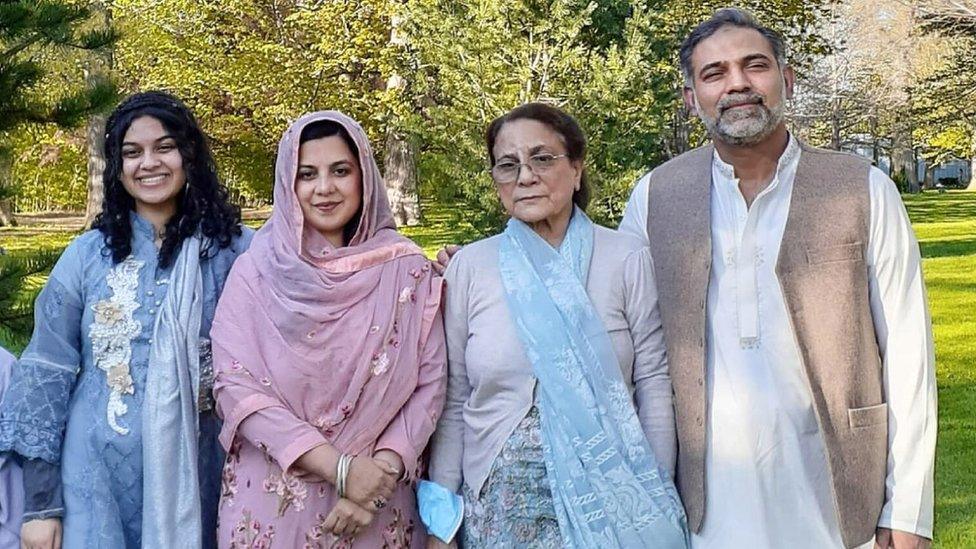Nathaniel Veltman trial: Canadian man gets life for killing Muslim family
- Published

From left to right: Yumna Afzaal, Madiha Salman, Salman's mother Talat Afzaal, and Salman Afzaal were "the best" of their community, friends said
A Canadian man who killed four members of a Muslim family was sentenced to life in prison as a judge ruled that his actions amounted to "white nationalist" terrorism.
Nathaniel Veltman, 22, was given five life sentences - four for murder and one for attempted murder.
Veltman was found guilty by a jury in November.
He ran down the family with his truck in 2021 while they were walking in London, Ontario.
Salman Afzaal, 46, and his wife Madiha Salman, 44, were killed by Veltman when he struck them with his truck. Their daughter Yumna Afzaal, 15, and Mr Afzaal's 74-year-old mother, Talat Afzaal, also died in the attack. The couple's nine-year-old son was seriously injured.
According to evidence introduced at trial, Veltman targeted the family randomly after spotting the two women in the family wearing traditional Pakistani dress.
Superior Court Justice Renee Pomerance said that Veltman "was seeking a place in the spotlight" when he attacked the family.
"It is my hope, the sense of fear and intimidation won't be a lasting message of these actions," she said during his sentencing on Thursday, according to the London Free Press newspaper.
The judge noted that Veltman picked out "innocent victims he had never met", and after the crimes he confessed to police and flashed the OK symbol - an everyday gesture that white supremacists have attempted to co-opt.
"He wanted to commit a crime against all Muslims by threatening their safety and security," she said.
Veltman will not be eligible for parole for 25 years.
The case was the first time a Canadian jury heard legal arguments about white supremacist terrorism.
During an earlier sentencing hearing in January, an unprecedented number of victim impact statements - nearly 70 - were given in court.
Many remarks underscored the irreparable harm experienced by the relatives and friends of the Afzaals - especially the family's orphaned son.
"All innocence was robbed from him that day," said Sayeda Sidra Jamal, a relative of Madiha Salman.
Ms Jamal told the hearing about the fear that the attack spread among the Muslim community in London.
"Will someone else target us? Dehumanize us? Hurt us? Kill us?" she said.
A statement written by the son was also read out during the January hearing.
The boy said that he was "very sad at the fact I can't talk to my family anymore and make new memories with them".
"I will have to get the metal plate in my leg removed which will be painful and I will have to learn how to walk again," he wrote.
He ended his statement with a message "to all the young kids".
"You may think that your siblings are really annoying, and to be honest I thought the same about Yumnah, but when they leave you would love to fight with them one last time," he wrote.
The Afzaal family moved to Canada from Islamabad in 2007. Their murder raised concerns in the wider Muslim community in London and Canada in the aftermath of the attack.
In a January statement, Veltman spoke of his "deep regret" over the murders.
"Over the course of days, months and years following June 6... I've seen the extent of pain and suffering that my actions did cause," he said.
Speaking to reporters outside the court on Thursday, Veltman's lawyer Christopher Hicks said he had expected the judge's ruling on terrorism, and left open the possibility of appeal against the verdict.

The coffins of the Afzaal family were draped in Canadian flags during a funeral service shortly after the murders
Taking the stand in his own defence during the trial, Veltman said he was scarred by a strict Christian upbringing and struggled with obsessive compulsive disorder.
He also said that he was left detached from reality after taking magic mushrooms in the days before running the family down.
However, Judge Pomerance rejected those arguments during Thursday's sentencing, saying they did not explain his actions. She said that Veltman "drew his rage from internet sources".
Evidence introduced at trial showed that Veltman spent a month before the killings working on a document calling for violence, and was influenced by mass murders in New Zealand and Norway.
"The tentacles of hate can reach a broad audience when they are only a click away," the judge said.
- Published5 January 2024

- Published16 November 2023

- Published14 June 2021
